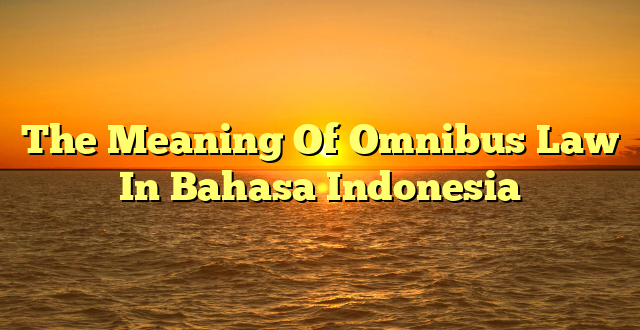Introduction
In 2023, the Omnibus Law has become one of the most talked-about topics in Indonesia. The government claims that the Omnibus Law can improve the country’s economic growth and create more job opportunities. However, many people are still confused about what the Omnibus Law actually means. In this article, we will explain the meaning of Omnibus Law in Bahasa Indonesia.
What is Omnibus Law?
The Omnibus Law is a law that combines various regulations into one comprehensive law. This law aims to simplify the bureaucratic process and eliminate overlapping regulations. The Indonesian government has implemented the Omnibus Law to attract more investment and boost the country’s economic growth. The Omnibus Law consists of various sectors, such as labor, investment, taxation, and environmental regulations.
Benefits of Omnibus Law
The Indonesian government claims that the Omnibus Law can bring many benefits to the country. One of the most significant benefits is the streamlining of the bureaucratic process. This will make it easier for investors to do business in Indonesia. The Omnibus Law also aims to create more job opportunities and reduce poverty. Moreover, the Omnibus Law can attract more foreign investment, which can boost the country’s economic growth.
Criticism of Omnibus Law
Despite the government’s claims, the Omnibus Law has faced many criticisms from various parties. Labor unions and environmental activists are among the most vocal critics of this law. They argue that the Omnibus Law can harm workers’ rights and damage the environment. Moreover, some experts argue that the Omnibus Law can eliminate the checks and balances system in Indonesia’s legal system.
Labor Regulations in Omnibus Law
One of the most controversial sectors in the Omnibus Law is labor regulations. The Omnibus Law aims to simplify the labor regulations and make it easier for employers to hire and fire workers. However, labor unions argue that this law can harm workers’ rights and job security. They also argue that this law can create a more significant income gap between workers and employers.
Investment Regulations in Omnibus Law
The Omnibus Law also includes several regulations related to investment. This law aims to simplify the investment process and eliminate overlapping regulations. However, some experts argue that this law can harm small and medium enterprises (SMEs). They argue that the Omnibus Law can favor big corporations and foreign investors, which can harm the local economy.
Environmental Regulations in Omnibus Law
The Omnibus Law also includes regulations related to environmental protection. However, environmental activists argue that this law can harm the environment. They argue that the Omnibus Law can make it easier for corporations to exploit natural resources and damage the environment. Moreover, they argue that this law can eliminate the checks and balances system in Indonesia’s environmental regulations.
Conclusion
The Omnibus Law is a comprehensive law that aims to simplify the bureaucratic process and attract more investment to Indonesia. However, this law has faced many criticisms from various parties, especially labor unions and environmental activists. The Indonesian government needs to address these criticisms and ensure that the Omnibus Law can bring benefits to all parties involved.
